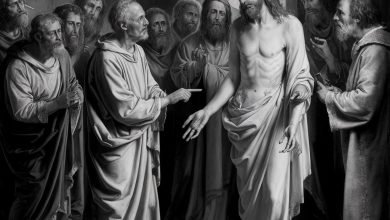
Who was Jezebel in the Bible and what did she do?
Jezebel, the daughter of Ethbaal, King of Sidon, and the wife of Ahab (Ahav), King of Israel, was instrumental in promoting the worship of false gods in Israel, persecuting and even killing the prophets of God, and conspiring to accuse an innocent man falsely and have him killed.
When people hear the name “Jezebel,” they often associate it with a Biblical character notorious for wickedness and defiance against God. In the Old Testament, Jezebel was the daughter of Ethbaal, King of Sidon, and the wife of Ahab, King of Israel. Jezebel promoted the worship of false gods in Israel, persecuted and killed the prophets of God, and conspired to accuse an innocent man falsely and have him killed.
The name “Jezebel” has become a symbol of traits such as wickedness, deceitfulness, and seduction. In fact, the term “Jezebel spirit” is used today to describe someone who is cunning and deceitful. Let’s delve into the details of Jezebel’s story in the Bible—a tale that serves as a lesson about disobedience and idolatry.
فرست محتوا
Jezebel and King Ahab
King Ahab, who “did more evil in the eyes of the Lord than any [king of Israel] before him” (1 Kings 16:30), married Jezebel and made her queen of Israel. As we read in 1 Kings 16:31, Jezebel was the daughter of Ethbaal, the King of Sidon (or Phoenicia).
Before becoming king, Ethbaal was known as a priest of Astarte. Astarte, the Greek form of the moon goddess Ishtar, was worshipped by the Phoenicians under this name. According to Easton’s Bible Dictionary, Ishtar “is frequently associated with Baal, the sun-god, [the principal male deity of the Phoenicians].”
Jezebel’s father, Ethbaal, had political ties with King Ahab in Israel, which likely facilitated the marriage. This influence led to the promotion of false gods among the people of Israel.
As stated in 1 Kings 16:31-32, Jezebel persuaded her husband to promote the worship of Baal and Astarte among the people of Israel. During that era, kings usually built temples for their foreign wives. In this case, Jezebel demanded a temple and an altar for Baal, which was built in Samaria. Being a Phoenician, Jezebel likely took a more active role than usual in Hebrew governance. Her commanding personality quickly led her to control her husband, thus steering Israel away from God and towards idolatry.
During Ahab’s reign over Israel, the people were divided into two groups: those who worshipped and served Baal and those who believed in Yahweh (the Lord). Hostilities escalated to the point where Jezebel ordered the killing of the prophets of Yahweh while fully supporting the prophets of Baal and Astarte.
read more : Who was Moses in the Bible? Facts about him

Jezebel vs. Elijah
Jezebel’s main adversary was the prophet Elijah, who refused to worship Baal. Elijah invoked God’s punishment in the form of a three-year drought over Israel (James 5:17). Following this event, a confrontation between Elijah and King Ahab led to a gathering of all the prophets on Mount Carmel. At this gathering, Elijah declared himself the only remaining prophet of the Lord after the execution of the others. The number of Baal’s prophets at the time was 450.
Elijah requested two bulls, one for himself and the other for Baal’s prophets. The bulls were to be cut into pieces and placed on wood arranged as an altar but without using any fire. Elijah challenged the prophets of Baal to call upon their god, Baal, to light the fire for their sacrifice. He, in turn, would call upon the Lord to light the fire for his own sacrifice.
The prophets of Baal called upon their god for hours, but no response came. Their silence caused them great anxiety. As noted in 1 Kings 18:28, “So they shouted louder and slashed themselves with swords and spears, as was their custom, until their blood flowed.”
When it was Elijah’s turn, he cut the bull into pieces and arranged it on the wood without using any fire. He added twelve stones to the altar, representing the twelve tribes of Jacob’s sons. He also dug a trench around the altar. Elijah then asked the people to pour four jars of water over the offering and the wood. He instructed them to do this at least three times until the water filled the trench around the altar.
Elijah called upon the Lord and pleaded, “O Lord, God of Abraham, Isaac, and Israel, let it be known today that you are God in Israel and that I am your servant and have done all these things at your command. Answer me, O Lord, answer me, so these people will know that you, O Lord, are God, and that you are turning their hearts back again” (1 Kings 18:36-37).
At that moment, “the fire of the Lord fell and burned up the sacrifice, the wood, the stones, and the soil, and also licked up the water in the trench” (1 Kings 18:38). When the people witnessed God’s power, they fell prostrate and declared, “The Lord—he is God! The Lord—he is God!” (1 Kings 18:39). Elijah then ordered the execution of all the prophets of Baal.
When Ahab recounted the event to Jezebel, the queen, consumed with rage and a thirst for revenge, vowed to kill Elijah. Aware of Jezebel’s fury and her immediate desire for vengeance, Elijah fled to the wilderness and took refuge under a juniper tree.
Translation of 1 Kings 19:1-2:
“Ahab told Jezebel all that Elijah had done, and how he had killed all the prophets with the sword. So Jezebel sent a messenger to Elijah to say, ‘May the gods deal with me, be it ever so severely, if by this time tomorrow I do not make your life like that of one of them.'”
Who is Naboth and Why Did Jezebel Have Him Killed?
Jezebel continued her path of vengeance and oppression, determined to showcase her wickedness and ruthlessness. In 1 Kings 21, we see how Jezebel orchestrated Naboth’s death.
Naboth, a God-fearing man who always sought to honor Him, owned a vineyard near King Ahab’s palace. Ahab asked Naboth to give him the vineyard to use as a vegetable garden, offering to either return a more profitable vineyard or pay its full price. However, Naboth refused the request, as stated in 1 Kings 21:3: “The Lord forbid that I should give you the inheritance of my fathers.”
Ahab became “sullen and angry” (1 Kings 21:4) and went home to sulk on his bed. Jezebel, upon seeing him in this state, mocked his weakness and assured him she could resolve the situation and improve his mood.
Jezebel devised a cunning plan to seize the vineyard. She forged letters in Ahab’s name and sealed them with his seal, calling for a public fast. These fake letters also ordered Naboth to be accused of blasphemy against God, supported by false testimony from two scoundrels. The letters also decreed Naboth’s stoning. Jezebel’s wicked scheme was executed perfectly, and Naboth was unjustly put to death.
As soon as Ahab heard of Naboth’s death, he went to take possession of the vineyard. As instructed by God, the prophet Elijah came out of the wilderness to meet Ahab in the vineyard. There, Elijah condemned Ahab for Jezebel’s conspiracy against Naboth and Ahab’s own sinful actions leading the Israelites astray.
Because of Jezebel’s sin in this matter, the Lord declared, “Dogs will devour Jezebel by the wall of Jezreel” (1 Kings 21:23). The Lord placed much of the blame on Jezebel, explaining, “There was never anyone like Ahab, who sold himself to do evil in the eyes of the Lord, urged on by Jezebel his wife” (1 Kings 21:25). When Ahab “heard these words,” he recognized his sin in this conspiracy and “tore his clothes, put on sackcloth and fasted. He lay in sackcloth and went about meekly” (1 Kings 21:27).
In His boundless mercy, the Lord appeared to Elijah and said that because Ahab had humbled himself, the punishment would not come during his lifetime but during his son’s reign. Ahab lived for three more years and died in a battle between Syria and Israel. His son Ahaziah succeeded him but did not reign long, followed by his successor, Jehoram.

Death of Jezebel
The prophet Elisha, Elijah’s successor, commanded Jehu, a commander in Jehoram’s army, to destroy all of Ahab’s descendants.
After killing Jehoram, Jehu headed towards Jezreel, where Queen Jezebel resided. He saw Jezebel as an obstacle to his ascent to power. In 2 Kings 9:30, we read: “When Jezebel heard about it, she painted her eyes, arranged her hair, and looked out of a window.” This adornment was not to seduce Jehu but to display her splendor, pride, and arrogance. Jehu looked up at the window and asked, “Who is on my side? Who?” Two or three eunuchs looked down at him. “Throw her down!” Jehu said (2 Kings 9:32-33).
Eunuchs at that time served as attendants to women in the royal court. Likely, Jezebel had treated them harshly, receiving no affection from them. Thus, when Jehu ordered them to throw her down, the eunuchs promptly obeyed, throwing Jezebel out of the window. Her body was trampled by horses and, as Elijah had foretold, devoured by dogs.
In a twist of irony, Jezebel’s pride, selfishness, and greed ultimately led to her downfall and death. She had used her charm and influence to gain power, steering the people towards Baal worship. However, her pride and thirst for vengeance led to her demise. When God’s judgment came upon her family, as promised, she faced the consequences of her actions.





